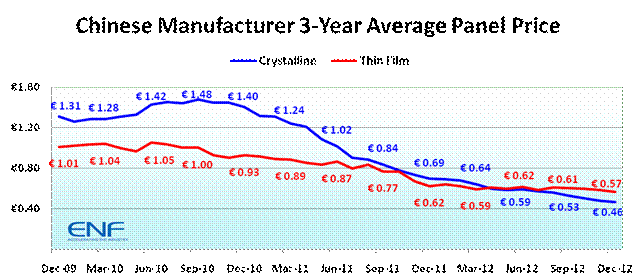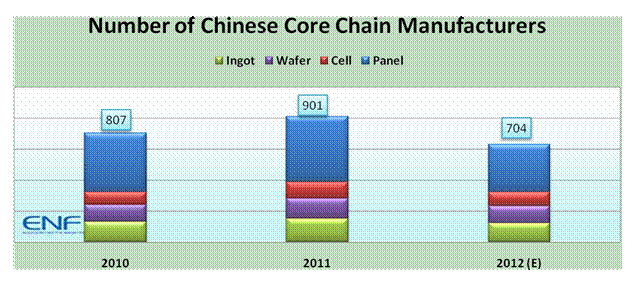2012 has been the most difficult year to date for Chinese solar manufacturers. Too many new manufacturers flooded into the industry in 2011, with the number of core solar chain producers (ingot, wafer, cell and panel) rising from 807 manufacturers to 901 manufacturers.
This has resulted in a serious price crash as producers fought to keep their factories running. Prices that Chinese manufacturers were selling their crystalline panels in December 2011 stood at €0.68/Wp ($0.92) but by December 2012 that had plunged to €0.46/Wp ($0.60).
For thin-film panel manufacturers the situation was even worse, unable to lower their cost of manufacturing fast enough they saw their average selling price actually become more expensive than crystalline panels. Chinese thin-film panel prices dropped from €0.63/Wp ($0.85) in December 2011 to €0.57/Wp ($0.74) in December 2012. Historically, most large customers would only purchase thin-film panels due to the cost being significantly lower than crystalline panels, and so much of the thin-film industry has come to a grinding halt.

As profits vanished, many manufacturers went bankrupt. During 2012 the number of core solar chain manufacturers dropped from 901 to 704, with a particular drop among panel manufacturers from 624 manufacturers to 454 manufacturers. In addition a further 180 core chain manufacturers went to sleep.
In the Chinese solar industry, a small manufacturer will generally only take a customer order if he can make a profit, and will generally not produce anything until a profitable customer is in hand. So when a bubble occurs and orders dry up completely, a small manufacturer will often just shut their gates and ask their employees to come back in the future when the industry is in better health. This phenomenon is excellent for the industry's health - instantly sucking capacity out of the market as it becomes too bloated. So while the small players may have contributed to the solar bubble by jumping in without understanding global market supply and demand trends, they also act to remedy an unprofitable market.
2013 is showing signs of increasing demand - and as the solar winter ends, we should see the re-emergence of the small sleeping manufacturers.

Source: ENF Solar (www.enfsolar.com)



